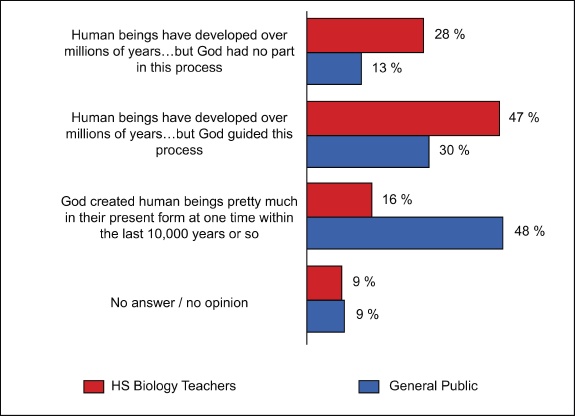In the perpetual fight over evolution in public schools, there is good news and bad news. The good news is that supporters of science education have largely been successful in shutting down creationist attempts to undermine evolution through state legislatures and state school boards. While there is still mischief going on in many state legislatures, these efforts rarely go anywhere, thanks to vigilance by supporters of good science education. An essay in PLoS Biology today argues that, at the state level, things are going well:
At this time, not a single state uses its content standards to explicitly promote ID or creationism. School boards are monitored by organizations like the National Center for Science Education, by state academies of science, and by local scientific and professional organizations. As a result, few state school boards can formally consider measures like the one adopted in Dover without scrutiny and challenge from organizations representing the scientific profession.
But here comes the bad news:
There are many reasons to believe that scientists are winning in the courts, but losing in the classroom.
To assess what's going on in classrooms around the country, the authors surveyed about ~1000 high school biology teachers on what they teach, and how much time they spend teaching it.
So how bad are things, really? In terms of outright creationism in the classroom, 25% of biology teachers say that they spend some time on some form of creationism in the classroom. About half of those teachers, meaning ~12.5% of all teachers surveyed, say they teach some form of creationism as a scientific alternative to evolution. (The rest appear to discuss creationism in order to contrast science ideas with non-scientific ones.) Personally, I'm surprised that the number is so low - given how huge and heterogeneous the US public school system is, I think it's relatively good news that fewer than 15% of biology teachers are actively promoting creationism as science in their classrooms.
While creationism may not be actively promoted, is evolution getting shortchanged? Unfortunately, the answer is yes. Teachers appear to not spend enough hours teaching this core element of biology. One number stands out - 17% of classrooms have no coverage whatsoever of human evolution, which is disappointing for several reasons: humans are usually most interested in themselves, thus human evolution can be one of the most compelling subjects that kids learn in biology class; human evolution also plays a central role in one of the most active research fields, comparative genomics, a field that is currently making a big impact on how we understand human health.
But perhaps this number - 17% which don't cover human evolution, isn't so bad - after all, if 12.5% of teachers are actively promoting creationism, that same group is not likely to teach human evolution. That leaves 5% who don't promote creationism, but don't teach human evolution either.
It's the Teacher that Makes the Difference
Teacher attitudes are also encouraging. Teachers' attitudes on evolution is significantly different from that of the general public:

While 48% of the general public appears to believe that humans poofed into existence 10,000 years ago, only 16% of teachers share that belief - again, possibly the same 12%-17% of teachers who promote creationism and don't teach human evolution. Not surprisingly, teachers who espouse the young-earth creationist view also spend less time teaching evolution. On the flip side, the more college biology education a teacher has had, the more time that teacher spends on evolution: those with the most biology training spend 60% more time than those with the least.
That so few high school biology teachers accept young-earth creationism, should be heartening for another reason: I think it suggests that, with education, fewer people will oppose the science of evolution. Intellectual temperament may make scientists less inclined than the general public to be religious, but I would bet that this is not true of teachers. Teachers probably more closely reflect the religious and cultural demographics of where they work than scientists do. Which means that if education improves teacher's attitudes towards evolution, it can improve the attitude of the general public.
The fact that 12%-17% of US high school biology teachers are creationists is, I think, sad but encouraging. I expected the number to be higher. Those 12%-17% are hearts and minds that will probably never be won over to mainstream science, but the vast majority of high school biology teachers appear to support good science education. The attitude is there - what teachers now need is support: support from administrators, the community, and scientists to teach solid science in spite of the inevitable pressure from some parents who want to not only religiously indoctrinate their own children in creationism, but everyone else's as well. The scientific community and national teacher organizations are working to improve their support, with publications like Evolution: Education and Outreach that provide lesson plans and accessible summaries of the large, constant flow of new research in evolutionary biology.
Evolution and the law appear to now be a largely settled matter, albeit one that still requires ongoing effort to maintain the status quo. Winning hearts and minds in the classroom is the more difficult, and more rewarding challenge facing the scientific community now.





Comments